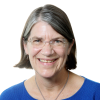Column: Learning Matters: Telling our stories creates a tapestry of our family histories
A number of years ago, the Glendale Stake of the Latter-day Saints presented me (a Methodist) with the gift of my ancestry: the longest family line their archivists could trace among my four grandparents.
Until then, based on my mother’s family records and her telling, I’d assumed I was English, Irish, Scottish, and Danish. Through their gift, I was surprised and delighted to discover I’m part Norwegian.
I learned I’m related to Irsa Helgasdatter, by way of Lulach the Fool, son of Lady Macbeth by her first husband.
“How cool is that!” I proudly mused, calling our daughter right away to tell her we’re descendants of Lady Macbeth.
Then one day it dawned on me that all of us have a history as long, and likely as storied. If only we knew the stories — and not just the long-ago histories, but the ones closer to home.
Family storytelling is at the heart of a project underway at the Glendale Public Library, in collaboration with the California State Library and StoryCenter.
In a two-day workshop, participants — including me — will be given the opportunity to make a short film about a part of our life, for inclusion in a California collection, “...a tapestry of the state, diverse voices, diverse experiences about what it means to be in California.”
The larger goal, at least as I see it, is to encourage storytelling and sharing among all our residents, to increase our appreciation for each other and improve civic life. But the immediate goal for me is to figure out the story I’ll tell.
What does being a Californian mean to me, born as I was in the San Gabriel Valley to Nebraska-native parents who settled here after World War II, and whose great-great grandparents arrived in the United States in the 18th and 19th centuries?
Unlike more recent immigrants whose stories I’ve been privileged to hear, families whose arrival in California remains a profound and present memory, being a Californian is just who I am. It’s hard to find the drama in my presence here.
But as I reread my mother’s diaries and reflect on the stories she told about her farm-town childhood, her working years as a nurse alongside my doctor father in small towns in Nebraska, and their moves from one army base to another before he was called into service in Europe, I realize I’m part of a broader history of migration to California.
It’s a history of people who came here for a variety of reasons: to work in a booming, post-war economy, to follow family who’d been stationed here during the war, to escape Midwestern winters, and likely, too, for reasons personal to them.
In Glendale, as in my hometown of Monrovia, I was part of the Midwestern migration. I can think of many friends whose parents came from Nebraska, Iowa, Ohio or Illinois.
I suspect some of them attended reunions like the Minden, Neb., picnics I attended as a child, at a park in Alhambra. I still remember the bucket swings and the two tall slides — one with a hump and one with a dip.
I loved those picnics just for the slides, but I’m sure my grandmother loved them for the friends she saw.
Our three children didn’t get a chance to listen to my mother’s stories about her move to California during the war, to help her sister and parents who’d come here.
They didn’t get to hear their grandparents talk about why they settled here when my dad returned from the war. But I think I can speak for our children in saying they’re glad to have been raised in California.
Our children all live elsewhere now, with work and lives in other states, but they’re grateful to be woven into the diverse tapestry that is California.
JOYLENE WAGNER is a past member of the Glendale Unified school board, from 2005 to 2013, and currently serves on the boards of Glendale Educational Foundation and other nonprofit organizations. Email her at jkate4400@aol.com
JOYLENE WAGNER is a past member of the Glendale Unified school board, from 2005 to 2013, and currently serves on the boards of Glendale Educational Foundation and other nonprofit organizations. Email her at jkate4400@aol.com.
